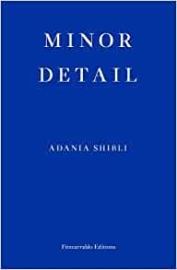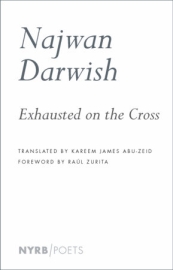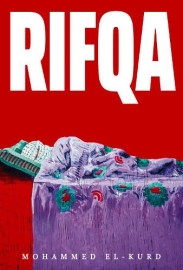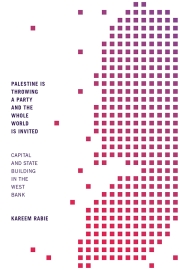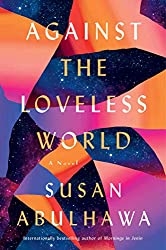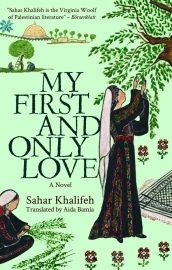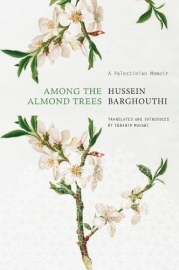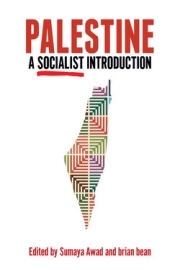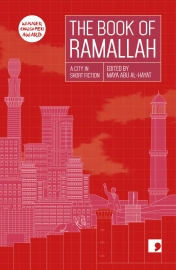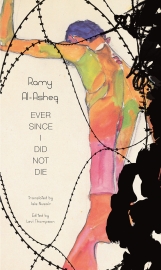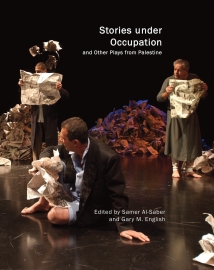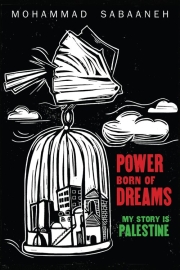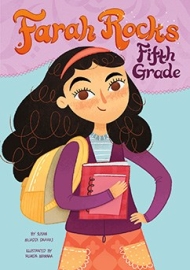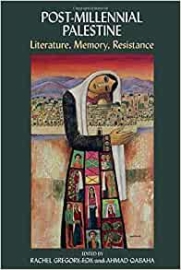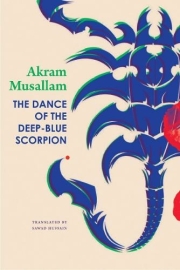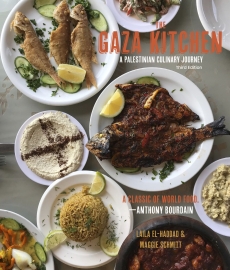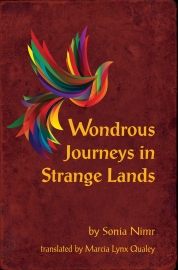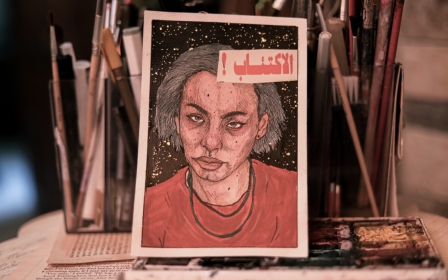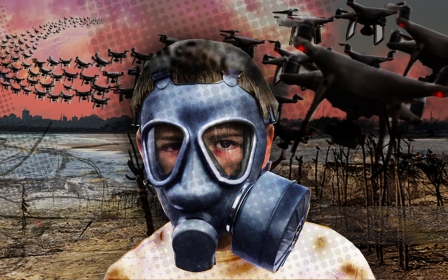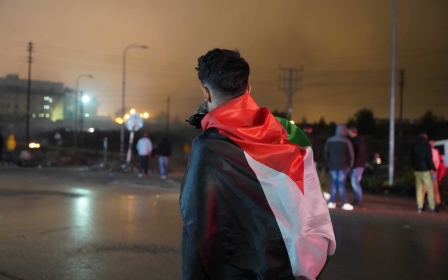17 new books by Palestinian writers that are worth reading
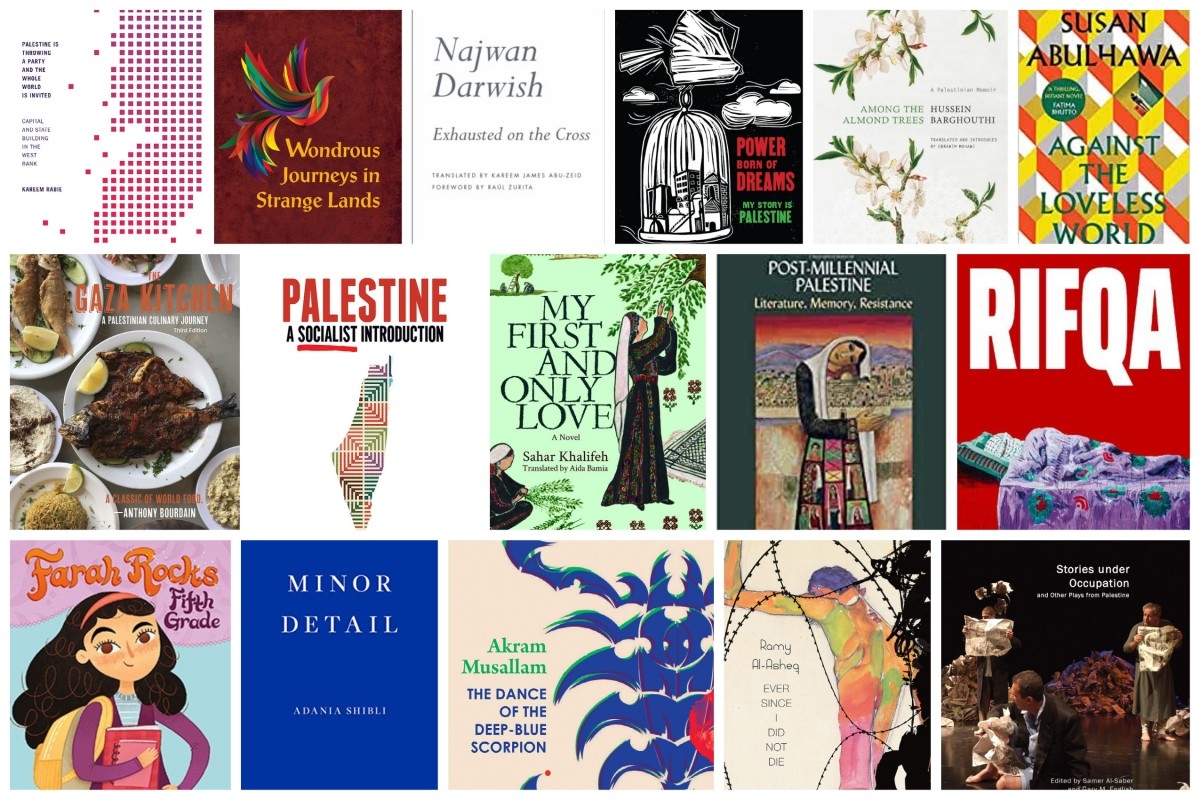
Over the past century, Palestinian literature has flourished in various genres and languages, persisting against censorship, blockade, occupation, and exile.
Palestine has produced writers of world-shaping significance, like poet Mahmoud Darwish and scholar Edward Said, as well as important literary initiatives, like the children’s publishing house Dar El Fata Al Arabi. Palestinian authors have pioneered new styles not only in Arabic, but also in English, French, Maltese, Dutch, and more.
But over the last 73 years, since the Nakba of 1948, Palestinian authors, bookshops, theatres, and cultural spaces have increasingly been targets of Israeli censorship and violence.
In the last two weeks in Bethlehem Israeli occupation forces broke into and raided Dar Yusuf Nasri Jacir for Art and Research, during a period of attacks by Israeli security forces and armed settlers that followed attempts to evict residents of the occupied neighbourhood of Sheikh Jarrah in East Jerusalem.
Organisers of this artist-run initiative wrote that “equipment was taken including phones, computer, hard drives, cameras, books and more”.
Meanwhile, in Gaza, Israeli airstrikes demolished bookshops and publishing houses, including the beloved Samir Mansour Bookshop in Gaza City, where authors like Hedaya Shamun from Gaza, who launched her short-story collection Daughter of the Sea at the store, could promote their books and hold events.
Still, across Palestine, a love of books persists. On 20 May, poet and Sheikh Jarrah native Mohammed El-Kurd shared a photograph on Twitter of a “tiny revolutionary bookshelf in Sheikh Jarrah” as a symbol of ceaseless resistance. “I hope the Hamas base inside these books doesn’t get bombed,” he added, referring to the Israeli government’s go-to justification for bombing any structure inside Gaza.
El-Kurd’s debut poetry collection, Rifqa, is just one of at least 17 exciting new or newly translated books by Palestinian writers available in English, or soon to be so.
The list below encompasses a broad range of exciting new scholarly works, memoirs, plays, fiction, poetry, and cookbooks by Palestinian writers in Palestine and beyond.
While by no means exhaustive, given that dozens of titles are published by exceptional Palestinian writers each year, this selection aims to showcase the breadth of style and genre of some of the writing coming out of Palestine and the Diaspora today.
1. Minor Detail
by Adania Shibli
The two equally relentless stories in this short, tightly paced novel take place side-by-side: one is based on a true story of an Israeli platoon that gang-raped a Bedouin girl in the Negev in 1949; the other follows a Palestinian woman who tries to investigate the crime decades later in her own awkward, insistent way. Their stories are connected by a fateful “minor detail”, and the two tragedies collide across time at the end of the novel.
Different silences hang heavily over the narrative, as here, back in 1949:
At about half past nine, he stood up again and asked everyone to be quiet. His eyes and face were deep red. He reminded them about the girl they had brought to the camp that day, and said that there were some soldiers who had fooled around with her. A thick silence prevailed, subduing the joyousness that had filled the tent until a moment earlier.
Minor Detail, which was published in Arabic in 2017, is Shibli’s third novel, and her third translated to English. Her work has won numerous prizes. Back in 2009, she was named one of the “Beirut39”- the top 39 Arab writers under 40 as rated by Banipal magazine. As a review in Publishers Weekly notes, the unexpected momentum of her prose “cries for rereading”.
Elisabeth Jaquette’s English translation of Shibli’s latest novel, published by Fitzcarraldo, was shortlisted for the National Book Award in the US and longlisted for the 2021 International Booker in the UK.
2. Exhausted on the Cross
by Najwan Darwish
This collection of poetry, translated by the award-winning Kareem James Abu-Zeid and published in February by New York Review Books (NYRB), was a much-anticipated follow-up to Najwan Darwish’s first collection to appear in English, Nothing More to Lose.
The Jerusalemite Darwish was, like Shibli, one of the “Beirut39” and the NYRB has lauded him as “one of the foremost Arabic-language poets of his generation”.
d In his introduction, Chilean poet Raul Zurita quotes from the poem Our Defeated Banner, which he says “represents one of the peak moments of his poetry as well as of the writing of our time”.
The poem is full of an insistence that is not necessarily hopeful but rather committed: “If I could come back, / I wouldn’t come under any other banner. / I’d still embrace you / with two severed hands.”
The collection was published in Arabic in 2018, titled Ta'iba al-mu'allaqun.
3. Rifqa
by Mohammed El-Kurd
Rifqa is 22-year-old Mohammed El-Kurd’s debut poetry collection, scheduled for release in October 2021 from Haymarket Books. El-Kurd, who has become one of the faces of Sheikh Jarrah activism, named the collection in honour of his late grandmother, who was forced to flee from Haifa in 1948.
The poems in the book narrate the author’s personal and familial experience of dispossession in Sheikh Jarrah; it was October 2020 when the Israeli authorities’ Magistrate Court ruled to forcibly evict his household, along with half of the neighbourhood.
As El-Kurd wrote in Mada Masr earlier this year, he wasn’t surprised by the ruling: “Since I was a boy, my sense of time has been intrinsically tied to court dates. ‘If they steal the house’ was a constant refrain in my ear.”
The family’s appeal was rejected on February 16, and they, along with more than two dozen others, were ordered to vacate their homes on 2 May 2021.
One of his poems, This Is Why We Dance, begins with a tribute to his grandmother, who died at the age of 103: “Home, in my memory, is a green, worn-out couch / And my grandmother in every poem.”
His poems depict home takeovers and demolitions across historic Palestine in a clear, narrative verse.
4. Palestine Is Throwing a Party and the Whole World Is Invited:
Capital and State Building in the West Bank
by Kareem Rabie
The title of scholar Kareem Rabie’s book comes from the first-ever Palestine Investment Conference, held in 2008. At it, then-Palestinian Prime Minister Salam Fayyad, in addressing international investors, said that Palestine was “throwing a party, and the whole world is invited”.
While some have suggested that a thriving private economy would lead to a free and functional Palestinian state, Rabie, an anthropology professor at American University, contends that such investment-based policies - like the ones Fayyad initiated in 2008, and the ones encouraged by Jared Kushner - have maintained the status quo.
Rabie’s book, published this month by Duke University Press, looks at the people and projects of Palestinian urban planning, from its developers and designers to the settlers and the land.
As Rabie writes in his introduction: “development and planning are in part about world making and imagination; I parse what is fantastic and what is real and explore how they are intertwined.”
5. Against the Loveless World
by Susan Abulhawa
Against the Loveless World, Susan Abulhawa’s second novel, the winner of the 2020 Palestine Book Awards and finalist for the 2021 Aspen Literary Prize, was published by Bloomsbury last August.
Abulhawa is also a poet, and this novel is narrated in her richly detailed, deeply emotive style as Nahr, its protagonist, tries to wrest control of her story away from politicians, reporters, and NGO workers. Nahr was born in Kuwait in the 1970s to Palestinian parents. In 1980s Kuwait, things seemed possible.
But Nahr’s husband leaves her after a brief marriage, she turns to sex work to make a living, and then the US invasion of Iraq turns her into a refugee all over again. She ends up back in Palestine, where her life once again turns upside-down.
Nahr tells us her story, which “returns to me in images, smells, and sounds, but never feelings. I feel nothing”.
6. My First and Only Love
by Sahar Khalifeh
One of Khalifeh’s 11 novels published in Arabic, My First and Only Love is her latest to be released in English, translated by Aida Bamia. It first appeared in Arabic in 2010 and the English translation was published this spring.
The novel is an extension of the world Khalifeh created in her 2009 novel Of Noble Origins, which was also translated by Bamia and published in English in 2012.
My First and Only Love details the elderly protagonist’s return to Nablus, where she lived before 1948, before she was forced into exile. When she meets her first love it sends her - and the reader - on an exploration of her childhood during the final days of the British Mandate.
Khalifeh is a gifted writer and a finalist for the prestigious Neustadt International Prize for Literature in 2020. One of the exceptional things she does with both My First and Only Love and Of Noble Origins is to bring the reader to well-known moments in history and help us see them through fresh eyes, particularly through the eyes of ordinary women.
7. Among the Almond Trees
by Hussein Barghouthi
A widely admired stylist, Hussein Barghouthi’s experimental, poetic texts ranged over a variety of genres: he wrote critical essays, novels, memoirs, and poetry, and translated Shakespeare’s Romeo and Juliet into Arabic. Born near Ramallah in 1954, he earned his PhD at the University of Washington in Seattle before returning to Palestine, where he taught literature and founded the Ramallah-based House of Poetry.
Barghouthi’s memoir, Among the Almond Trees, is an examination of illness and death, loss and return, against the backdrop of the nature of central Palestine.
The author was in his late forties when he grew ill. He feared he had HIV, so he felt a bitter joy when diagnosed with lymphoma since that meant his wife and son would be spared. This bitter-sweetness is central to the moods of narration and reflection in Among the Almond Trees.
The memoir, forthcoming from Seagull Books in December, was translated by Palestinian translator and scholar Ibrahim Muhawi. The Arabic original was released in 2004.
Barghouthi’s beloved The Blue Light, his most well-known work, is also forthcoming in English translation from Seagull Books in 2022.
8. Palestine: A Socialist Introduction
edited by Sumaya Awad and Brian Bean
Palestine: A Socialist Introduction, published last December by Haymarket Books, pulls together essays by a wide range of Palestinian authors and scholars, from poet Remi Kanazi to the Boycott, Divestment and Sanctions (BDS) movement co-founder Omar Barghouti, to writer, translator, and activist Shireen Akram-Boshar.
The book uses an “internationalist, anti-imperialist” lens to explore not just Palestine, but the connections in freedom struggles around the world.
Human rights attorney and assistant professor Noura Erekat writes that this collection, “provides the reader with an internationalist framework, defined as a commitment to anti-imperialism, and uses it to place Palestine into local, regional, and global historical context”.
And scholar Sai Egbert says it "provides a powerful intellectual tool for those who want to understand the current situation and organise to change it".
This month, Haymarket Books has made the e-book edition available for free.
9. The Book of Ramallah
edited by Maya Abu Al-Hayat
This short-story collection, published by Comma Press this spring, includes 10 distinct portraits of Ramallah told in widely different styles, from minimalist to surrealist to satiric.
In Ziad Khadash’s wonderful Get Out of My House, which features a character named Ziad Khadash, the narrator comes home and is faced by another occupant who insists the house is hers. Things grow increasingly absurd as the police arrive, and then the landlord, with each person insisting the home belongs to someone different.
The Book of Ramallah includes stories by established writers like Ibrahim Nasrallah and Mahmoud Shukair, as well as emerging ones like Ameer Hamad, and it opens with a strong introduction by Abu al-Hayat.
In her introduction, Abu al-Hayat gives a short historical portrait of Ramallah and notes that, for many writers, the city has come to represent the “glimmer of hope that isn’t real”.
The book offers a chance to get to know not only Ramallah but also a rare opportunity to dip into work by 10 different Palestinian writers.
10. Ever Since I Did Not Die
by Ramy al-Asheq
This collection of short, lyric essays, translated by Isis Nusair and forthcoming in July 2021 from Seagull Books, brings together work from throughout al-Asheq’s life as a Palestinian-Syrian.
Ever Since I Did Not Die begins in a Palestinian refugee camp in Damascus. After the Syrian revolution, he ends up in prison in Jordan, and later to exile in Berlin.
Al-Asheq says, in introducing the collection, “I gathered these texts like someone collecting body parts. Here are the pieces of my body, haphazardly brought together in a paper bag. It looks like me with all my madness and sickness - how the revolution made me grow up, what the war broke inside me, and what exile chipped away.”
Al-Asheq’s clear-eyed work has been published widely, and some of his texts have been translated into songs, performances, and works of art. This collection was originally released in Arabic in 2016.
11. Stories Under Occupation: And Other Plays from Palestine
edited by Samer al-Saber and Gary M. English
Published last June by Seagull Books, Stories Under Occupation brings together several contemporary plays performed at Palestinian theatres in English.
It includes collectively written nonfiction works such as The Gaza Monologues, which weaves together the voices of 33 young people from Gaza and has been performed by thousands of students and theatre groups around the world.
Included too is the Jerusalem- and Ramallah-based Al-Kasaba Theatres’s play Stories Under Occupation, which also tells personal stories from Palestine.
There are also acclaimed, individually written works, like Amer Hlehel’s Taha, Nabil al-Raee’s The Siege, and Ihab Zahdeh’s Three in One, as well as introductions to Palestinian theatre by both al-Saber and English.
The anthology offers both a look at the range of contemporary Palestinian theatre and at how theatre can contribute to identity and resistance.
12. Power Born of Dreams: My Story is Palestine
by Mohammad Sabaaneh
This collection of cartoons, forthcoming from Street Noise Books in September 2021, is a follow-up to Sabaaneh’s earlier collection, Black and White.
Sabaaneh, a political cartoonist at the newspaper al-Hayat al-Jadida and a former political prisoner in Israel, etches his world in black-and-white linocut drawings.
Sabaaneh is the recipient of numerous awards, including the 2017 Marseille International Cartoon Festival Prix d’Or and currently lives in Ramallah.
In a cartoon from Black and White, a line of people with skull-like faces dance dabke near what appears to be a checkpoint with their ankles chained together.
Sabaaneh’s drawings are often allegorical. In this new collection, a bird perches on the cell window and offers a deal: “You bring the pencil, and I will bring the stories”.
13. Farah Rocks
by Susan Muaddi Darraj
This fun series of chapter books by award-winning writer Susan Muaddi Darraj is for readers aged 8-12. The books follows Farah Hajjar, known to her friends as “Farah Rocks”, for the literal translation of her last name.
Farah is a smart, courageous Palestinian-American girl who faces common issues like bullies, fights with her best friend, and school anxiety, while also honouring her Palestinian identity - there’s even a hummus recipe at the end.
This is a four-book series, and readers can find Farah in Farah Rocks Fifth Grade (2020), Farah Rocks Summer Break (2020), Farah Rocks New Beginnings (2021), and one more forthcoming Farah book from Capstone Publishing.
14. Post-Millennial Palestine: Literature, Memory, Resistance
edited by Ahmad Qabaha and Rachel Gregory Fox
This collection of academic essays about Palestinian literature, published this March by Oxford University Press, includes work by Palestinian and non-Palestinian scholars.
The studies look at a wide range of literary works written in Arabic and English.
Tahrir Hamdi looks at "late style as resistance" in works by Mahmoud Darwish, Mourid Barghouti, and Edward Said, while Ahmad Qabaha looks at exilic memory in Ghada Karmi's Return: A Palestinian Memoir.
Other essays look at more recent work by Palestinian writers Adania Shibli, Maya Abu al-Hayat, Selma Dabbagh, and Susan Abulhawa.
Palestinian scholar Bashir Abu-Manneh writes, in his foreword to the collection, that while the multiplicity of post-millennial Palestinian literature can be read as fragmentation, "it can also be seen as a form of sharedness: that Palestine is a project in common".
15. The Dance of the Deep-Blue Scorpion
by Akram Musallam
Akram Musallam was born near Nablus and published his first novel, Alexander’s Obsessions, in 2003. The Dance of the Deep-Blue Scorpion, his second (published in Arabic in 2008), won the A.M. Qattan Award and has been translated to French and Italian; the English translation is forthcoming from Seagull Books in October.
The story is told by a young man who works at a nightclub in Israel, as he sits on a plastic chair in a parking lot in Ramallah. The novel, translated by Sawad Hussain, is set in the late 1980s when its young protagonist briefly meets a French girl with a scorpion tattoo, which sparks his desire to write this book.
By turns absurd and painfully raw, this experimental novel paints a portrait of absence.
It has already been published in French and Italian translations, and Musallam said of the book at the Hay Festival in 2012, that, “there is a relationship between the body and place, between cutting off parts of the body and parts of place and also between how the brain continues to send signals to the amputated part and the preservation of stories about the place which has been cut off [from Palestinians].”
16. The Gaza Kitchen: A Palestinian Culinary Journey
by Laila El-Haddad and Maggie Schmitt
Cookbooks are also an important literary genre, and also central to writing down the everyday history and culture of Palestine. There have been several acclaimed Palestinian cookbooks published in recent years, including Craving Palestine, by Farrah Abuasad, Lama Bazzari, and Fadi Kattan, and Reem Kassis’s The Palestinian Table.
This June, a new edition of the award-winning The Gaza Kitchen is forthcoming from Just World Books. It brings together 130 recipes collected from cooks around Gaza, and features not only these kitchen-tested recipes, but also photos of the cooks, farmers, and produce sellers at work, and in-kitchen interviews with cooks across Gaza.
There is also a section of the book that introduces ingredients one must have in a Gazan pantry.
Previous editions of the cookbook received plaudits from no less than Anthony Bourdain and Claudia Roden.
This is the third edition, and it features new recipes, a new design, new photos, and an updated index.
17. Wondrous Journeys in Strange Lands
by Sonia Nimr
This Young Adult crossover novel by Palestinian scholar, ethnographer, and author, Sonia Nimr, was published in English last December by Interlink Books in this writer’s translation.
A historical fantasy, it begins when protagonist Qamr is still a young girl in Palestine who doesn’t quite fit in with the world around her, Wondrous Journeys in Strange Lands then goes on a thrilling journey as she searches first for herself and then for her family.
The novel takes us through journeys with medieval pirates, through the jungle in India, and joins a scholar in Morocco.
The novel was published in Arabic in 2013 and won the Etisalat Prize for Arabic Literature, in the YA category and the English translation was a finalist for the 2021 GLLI YA prize.
Also forthcoming in 2022, the first book in Nimr’s gripping time-travel fantasy trilogy Thunderbird will be published by the University of Texas Press.
Middle East Eye propose une couverture et une analyse indépendantes et incomparables du Moyen-Orient, de l’Afrique du Nord et d’autres régions du monde. Pour en savoir plus sur la reprise de ce contenu et les frais qui s’appliquent, veuillez remplir ce formulaire [en anglais]. Pour en savoir plus sur MEE, cliquez ici [en anglais].


